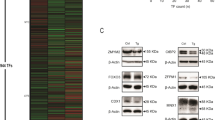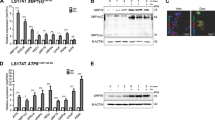Abstract
Intestinal epithelial stem cells are highly sensitive to differentiation induced by endoplasmic reticulum (ER) stress. Colorectal cancer develops from mutated intestinal epithelial stem cells. The most frequent initiating mutation occurs in Apc, which results in hyperactivated Wnt signalling. This causes hyperproliferation and reduced sensitivity to chemotherapy, but whether these mutated stem cells are sensitive to ER stress induced differentiation remains unknown. Here we examined this by generating mice in which both Apc and ER stress repressor chaperone Grp78 can be conditionally deleted from the intestinal epithelium. For molecular studies, we used intestinal organoids derived from these mice. Homozygous loss of Apc alone resulted in crypt elongation, activation of the Wnt signature and accumulation of intestinal epithelial stem cells, as expected. This phenotype was however completely rescued on activation of ER stress by additional deletion of Grp78. In these Apc-Grp78 double mutant animals, stem cells were rapidly lost and repopulation occurred by non-mutant cells that had escaped recombination, suggesting that Apc-Grp78 double mutant stem cells had lost self-renewal capacity. Although in Apc-Grp78 double mutant mice the Wnt signature was lost, these intestines exhibited ubiquitous epithelial presence of nuclear β-catenin. This suggests that ER stress interferes with Wnt signalling downstream of nuclear β-catenin. In conclusion, our findings indicate that ER stress signalling results in loss of Apc mutated intestinal epithelial stem cells by interference with the Wnt signature. In contrast to many known inhibitors of Wnt signalling, ER stress acts downstream of β-catenin. Therefore, ER stress poses a promising target in colorectal cancers, which develop as a result of Wnt activating mutations.
This is a preview of subscription content, access via your institution
Access options
Subscribe to this journal
Receive 50 print issues and online access
$259.00 per year
only $5.18 per issue
Buy this article
- Purchase on Springer Link
- Instant access to full article PDF
Prices may be subject to local taxes which are calculated during checkout







Similar content being viewed by others
References
Huels DJ, Sansom OJ . Stem vs non-stem cell origin of colorectal cancer. Br J Cancer 2015; 113: 1–5.
Kreso A, Dick JE . Evolution of the cancer stem cell model. Cell Stem Cell 2014; 14: 275–291.
Vermeulen L, Snippert HJ . Stem cell dynamics in homeostasis and cancer of the intestine. Nat Rev Cancer 2014; 14: 468–480.
Heijmans J, van Lidth de Jeude JF, Koo BK, Rosekrans SL, Wielenga MC, van de Wetering M et al. ER stress causes rapid loss of intestinal epithelial stemness through activation of the unfolded protein response. Cell Rep 2013; 3: 1128–1139.
Barker N . Adult intestinal stem cells: critical drivers of epithelial homeostasis and regeneration. Nat Rev Mol Cell Biol 2014; 15: 19–33.
van Galen P, Kreso A, Mbong N, Kent DG, Fitzmaurice T, Chambers JE et al. The unfolded protein response governs integrity of the haematopoietic stem-cell pool during stress. Nature 2014; 510: 268–272.
Rosekrans SL, Heijmans J, Büller NVJA, Westerlund J, Lee AS, Muncan V et al. ER stress induces epithelial differentiation in the mouse oesophagus. Gut 2015; 64: 195–202.
Vogelstein B, Fearon ER, Hamilton SR, Kern SE, Preisinger AC, Leppert M et al. Genetic alterations during colorectal-tumor development. N Engl J Med 1988; 319: 525–532.
Sansom OJ, Reed KR, Hayes AJ, Ireland H, Brinkmann H, Newton IP et al. Loss of Apc in vivo immediately perturbs Wnt signaling, differentiation, and migration. Genes Dev 2004; 18: 1385–1390.
Chen S, Guttridge DC, You Z, Zhang Z, Fribley A, Mayo MW et al. Wnt-1 signaling inhibits apoptosis by activating beta-catenin/T cell factor-mediated transcription. J Cell Biol 2001; 152: 87–96.
Paton AW, Beddoe T, Thorpe CM, Whisstock JC, Wilce MCJ, Rossjohn J et al. AB5 subtilase cytotoxin inactivates the endoplasmic reticulum chaperone BiP. Nature 2006; 443: 548–552.
Wolfson JJ, May KL, Thorpe CM, Jandhyala DM, Paton JC, Paton AW . Subtilase cytotoxin activates PERK, IRE1 and ATF6 endoplasmic reticulum stress-signalling pathways. Cell Microbiol 2008; 10: 1775–1786.
Yang W, Velcich A, Lozonschi I, Liang J, Nicholas C, Zhuang M et al. Inactivation of p21WAF1/cip1 enhances intestinal tumor formation in Muc2−/− mice. Am J Pathol 2005; 166: 1239–1246.
Barker N, van Es JH, Kuipers J, Kujala P, van den Born M, Cozijnsen M et al. Identification of stem cells in small intestine and colon by marker gene Lgr5. Nature 2007; 449: 1003–1007.
van de Wetering M, Sancho E, Verweij C, de Lau W, Oving I, Hurlstone A et al. The beta-catenin/TCF-4 complex imposes a crypt progenitor phenotype on colorectal cancer cells. Cell 2002; 111: 241–250.
Barker N, Ridgway RA, van Es JH, van de Wetering M, Begthel H, van den Born M et al. Crypt stem cells as the cells-of-origin of intestinal cancer. Nature 2009; 457: 608–611.
Robine S, Sahuquillo-Merino C, Louvard D, Pringault E . Regulatory sequences on the human villin gene trigger the expression of a reporter gene in a differentiating HT29 intestinal cell line. J Biol Chem 1993; 268: 11426–11434.
Sato T, van Es JH, Snippert HJ, Stange DE, Vries RG, van den Born M et al. Paneth cells constitute the niche for Lgr5 stem cells in intestinal crypts. Nature 2011; 469: 415–418.
Sansom OJ, Meniel VS, Muncan V, Phesse TJ, Wilkins JA, Reed KR et al. Myc deletion rescues Apc deficiency in the small intestine. Nature 2007; 446: 676–679.
van der Flier LG, Haegebarth A, Stange DE, van de Wetering M, Clevers H . OLFM4 is a robust marker for stem cells in human intestine and marks a subset of colorectal cancer cells. Gastroenterology 2009; 137: 15–17.
Montgomery RK, Carlone DL, Richmond CA, Farilla L, Kranendonk MEG, Henderson DE et al. Mouse telomerase reverse transcriptase (mTert) expression marks slowly cycling intestinal stem cells. Proc Natl Acad Sci USA 2011; 108: 179–184.
Muñoz J, Stange DE, Schepers AG, van de Wetering M, Koo B-K, Itzkovitz S et al. The Lgr5 intestinal stem cell signature: robust expression of proposed quiescent '+4' cell markers. EMBO J 2012; 31: 3079–3091.
Sangiorgi E, Capecchi MR . Bmi1 is expressed in vivo in intestinal stem cells. Nat Genet 2008; 40: 915–920.
Hann SR, Eisenman RN . Proteins encoded by the human c-myc oncogene: differential expression in neoplastic cells. Mol Cell Biol 1984; 4: 2486–2497.
Muncan V, Sansom OJ, Tertoolen L, Phesse TJ, Begthel H, Sancho E et al. Rapid loss of intestinal crypts upon conditional deletion of the Wnt/Tcf-4 target gene c-Myc. Mol Cell Biol 2006; 26: 8418–8426.
Wielenga MCB, Colak S, Heijmans J, van Lidth de Jeude JF, Rodermond HM, Paton JC et al. ER-stress-induced differentiation sensitizes colon cancer stem cells to chemotherapy. Cell Rep 2015; 13: 489–494.
Niederreiter L, Fritz TMJ, Adolph TE, Krismer A-M, Offner FA, Tschurtschenthaler M et al. ER stress transcription factor Xbp1 suppresses intestinal tumorigenesis and directs intestinal stem cells. J Exp Med 2013; 210: 2041–2056.
Holik AZ, Krzystyniak J, Young M, Richardson K, Jardé T, Chambon P et al. Brg1 is required for stem cell maintenance in the murine intestinal epithelium in a tissue-specific manner. Stem Cells 2013; 31: 2457–2466.
van der Flier LG, van Gijn ME, Hatzis P, Kujala P, Haegebarth A, Stange DE et al. Transcription factor achaete scute-like 2 controls intestinal stem cell fate. Cell 2009; 136: 903–912.
Schwitalla S, Fingerle AA, Cammareri P, Nebelsiek T, Göktuna SI, Ziegler PK et al. Intestinal tumorigenesis initiated by dedifferentiation and acquisition of stem-cell-like properties. Cell 2013; 152: 25–38.
van Es JH, Sato T, van de Wetering M, Lyubimova A, Nee AN, Gregorieff A et al. Dll1+ secretory progenitor cells revert to stem cells upon crypt damage. Nat Cell Biol 2012; 14: 1099–1104.
Rizvi AZ, Swain JR, Davies PS, Bailey AS, Decker AD, Willenbring H et al. Bone marrow-derived cells fuse with normal and transformed intestinal stem cells. Proc Natl Acad Sci USA 2006; 103: 6321–6325.
Verras M, Papandreou I, Lim AL, Denko NC . Tumor hypoxia blocks Wnt processing and secretion through the induction of endoplasmic reticulum stress. Mol Cell Biol 2008; 28: 7212–7224.
Anastas JN, Moon RT . WNT signalling pathways as therapeutic targets in cancer. Nat Rev Cancer 2013; 13: 11–26.
el Marjou F, Janssen K-P, Chang BH-J, Li M, Hindie V, Chan L et al. Tissue-specific and inducible Cre-mediated recombination in the gut epithelium. Genesis 2004; 39: 186–193.
Luo S, Mao C, Lee B, Lee AS . GRP78/BiP is required for cell proliferation and protecting the inner cell mass from apoptosis during early mouse embryonic development. Mol Cell Biol 2006; 26: 5688–5697.
Madisen L, Zwingman TA, Sunkin SM, Oh SW, Zariwala HA, Gu H et al. A robust and high-throughput Cre reporting and characterization system for the whole mouse brain. Nat Neurosci 2010; 13: 133–140.
Shibata H, Toyama K, Shioya H, Ito M, Hirota M, Hasegawa S et al. Rapid colorectal adenoma formation initiated by conditional targeting of the Apc gene. Science 1997; 278: 120–123.
Soriano P . Generalized lacZ expression with the ROSA26 Cre reporter strain. Nat Genet 1999; 21: 70–71.
van Dop WA, Heijmans J, Büller NVJA, Snoek SA, Rosekrans SL, Wassenberg EA et al. Loss of Indian Hedgehog activates multiple aspects of a wound healing response in the mouse intestine. Gastroenterology 2010; 139: 1665–1676 1676.e1661-1610.
Heijmans J, Muncan V, Jacobs RJ, de Jonge-Muller ESM, Graven L, Biemond I et al. Intestinal tumorigenesis is not affected by progesterone signaling in rodent models. PLoS One 2011; 6: e22620.
Sato T, Vries RG, Snippert HJ, van de Wetering M, Barker N, Stange DE et al. Single Lgr5 stem cells build crypt-villus structures in vitro without a mesenchymal niche. Nature 2009; 459: 262–265.
Sato T, Stange DE, Ferrante M, Vries RG, Van Es JH, Van den Brink S et al. Long-term expansion of epithelial organoids from human colon, adenoma, adenocarcinoma, and Barrett's epithelium. Gastroenterology 2011; 141: 1762–1772.
Greten FR, Eckmann L, Greten TF, Park JM, Li Z-W, Egan LJ et al. IKKbeta links inflammation and tumorigenesis in a mouse model of colitis-associated cancer. Cell 2004; 118: 285–296.
Acknowledgements
This work was supported by a VENI grant from the Dutch Organisation for Scientific Research (NWO) and by a research stipendium from the Dutch Cancer Foundation (KWF).
Author contributions
JFvLdJ, JH, VM, designed experiments, analysed and discussed data. JFvLdJ, BJM, MCBW, BB, SLR, YHS and SM performed the experiments. ASL provided Grp78fl/fl mice, JCP and AWP provided SubAB and SubAA272BJH, VM and GRvdB supervised the study. JFvLdJ and JH wrote the manuscript with input of all authors.
Author information
Authors and Affiliations
Corresponding author
Ethics declarations
Competing interests
The authors declare no conflict of interest.
Additional information
Supplementary Information accompanies this paper on the Oncogene website
Rights and permissions
About this article
Cite this article
van Lidth de Jeude, J., Meijer, B., Wielenga, M. et al. Induction of endoplasmic reticulum stress by deletion of Grp78 depletes Apc mutant intestinal epithelial stem cells. Oncogene 36, 3397–3405 (2017). https://doi.org/10.1038/onc.2016.326
Received:
Revised:
Accepted:
Published:
Issue Date:
DOI: https://doi.org/10.1038/onc.2016.326
This article is cited by
-
Endoplasmic reticulum stress regulates the intestinal stem cell state through CtBP2
Scientific Reports (2021)
-
Expression of UPR effector proteins ATF6 and XBP1 reduce colorectal cancer cell proliferation and stemness by activating PERK signaling
Cell Death & Disease (2019)
-
Increased sensitivity to apoptosis upon endoplasmic reticulum stress-induced activation of the unfolded protein response in chemotherapy-resistant malignant pleural mesothelioma
British Journal of Cancer (2018)



